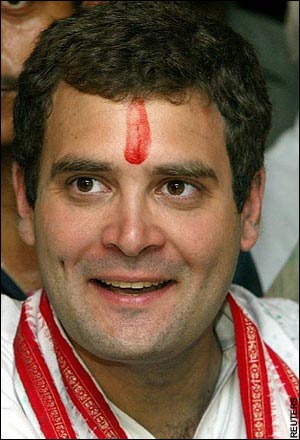The world's largest democracy, India, is shedding its distaste for military regimes. New Delhi's newly pragmatic turn has been confirmed with off-the-record praise for the army-backed political revolution currently sweeping Bangladesh.
For the record, Dhaka now follows Yangoon (or Naypitaw, as Myanmar's new capital in the back of the Burmese beyond is called) in India's list of military calling cards.
Indeed, concern for whether General Pervez Musharraf will don his uniform or campaign in civvies when elections are held in Pakistan sometime later this year, is already wearing thin.
The old morality mantra in South Block - where the prime minister's office as well as the ministries of foreign affairs and defence are located - has been replaced with a spanking, new realism.
It asks not whether high-sounding principles are good for your country, but what this country can do in the promotion of your national interest.
Presiding over this shift in both policy and national temperament is Prime Minister Manmohan Singh, even when he defers to Sonia Gandhi's political instinct for the poor.
Since the prime minister's instinct is much more right-wing, he seems much more comfortable with the George W. Bush Republican model that declares, let's do business tonight.
Bangladesh is a classic case in point. When the army in Dhaka took control of the rapidly deteriorating political situation in January, New Delhi reacted predictably by hoping that the people would be allowed to exercise their democratic right in a free and fair election as soon as possible.
Barely a month later, as Foreign Minister Pranab Mukherjee prepared to go to Dhaka, New Delhi signalled to Fakhruddin Ahmad's army-backed new caretaker government that it was prepared to invite Ahmad - and not President Iajuddin - to the South Asian Association of Regional Conference summit in Delhi in April, even if he wasn't an elected leader.
Mukherjee's flying visit in February was notable for one other thing. He may not have formally met Bangladesh army chief Lt. Gen. Moyeen U. Ahmad, but a couple of generals in uniform made it a point to attend every official meeting.
Indeed, it was India's high commissioner to Dhaka Pinak Chakraborty's meeting with the army chief, one day before the foreign minister's visit, that set the stage for the expression of the new pragmatism. It was at this meeting that the train service from Kolkata to Dhaka was finalised - a train that will now make its first journey on April 14, the Bengali new year.
Over the weeks, as contact between the Indian government and Dhaka's military headquarters grew and grew - on the sidelines of the public cleansing of Bangladesh's public life, that has touched a new high last week with the arrest of Tarique Rahman, son of former prime minister Khaleda Zia and considered to be the most powerful man in Bangladesh until the army took over two months ago - the generals began to speak a language that New Delhi had been waiting and waiting to hear.
For a start, they said, terrorism and insurgency was a bad thing and insurgent groups - whether or not they were anti-India and had taken refuge in Bangladesh's northern areas - could not be good for the country.
Secondly, since the character of any country was judged by the treatment of its minorities, Bangladesh had a duty and responsibility to protect its rapidly diminishing Hindu population, who had stayed loyal despite two partitions of the mother country. All minorities in Bangladesh, they said, had a right to live securely.
Relationship
The army-backed caretaker government also sought to push the relationship with New Delhi to a totally new trajectory, pointing out that a political fillip was needed. The Kolkata-Dhaka railway line could lead the way, while trade, Manmohan Singh's chosen diplomatic manifesto, could make way for the flag.
We are a unique army, the Bangladesh generals said to New Delhi again and again, we are not like Myanmar or Thailand. We are here to stay. We are not here to ape the politicians. We will clean up the system, however long it takes.
If the army can sweep such a strong broom at home, goes the argument, it can surely help weed out anti-Indian criminal and terrorist elements that have made Bangladesh their home.
Perhaps the Indian pragmatism takes heart from India's newfound partnership with the US. New Delhi feels that it ought to take responsibility at least for its own neighbourhood.
The Indian intervention in favour of the people's revolution last April in Nepal is a case in point. In Myanmar, New Delhi swings in favour of the military junta because Naypitaw promises help with insurgency and terrorism.
In Bangladesh, India believes, if the army can now broker a domestic, political peace as well as usher in a new bilateral partnership, then so be it.
Jyoti Malhotra is the Diplomatic Editor of Star News, India.










